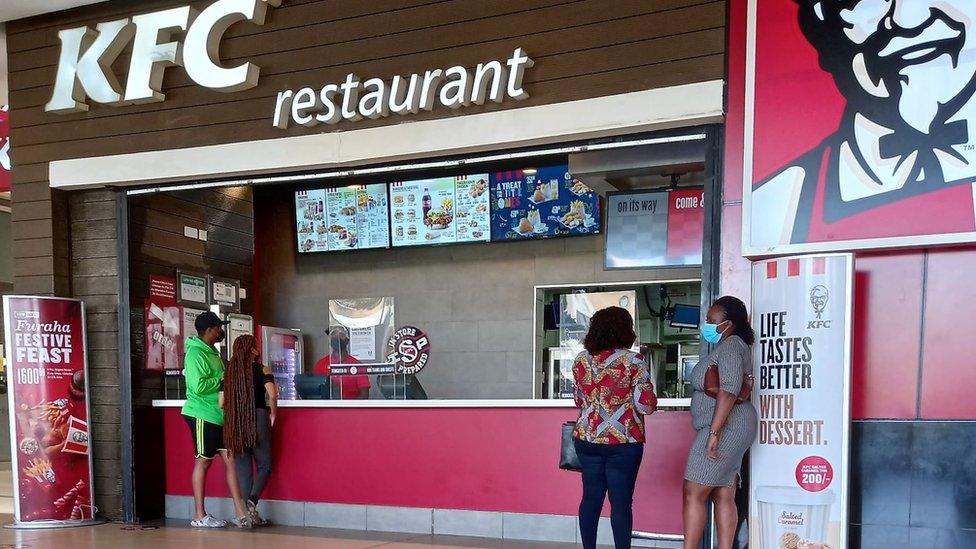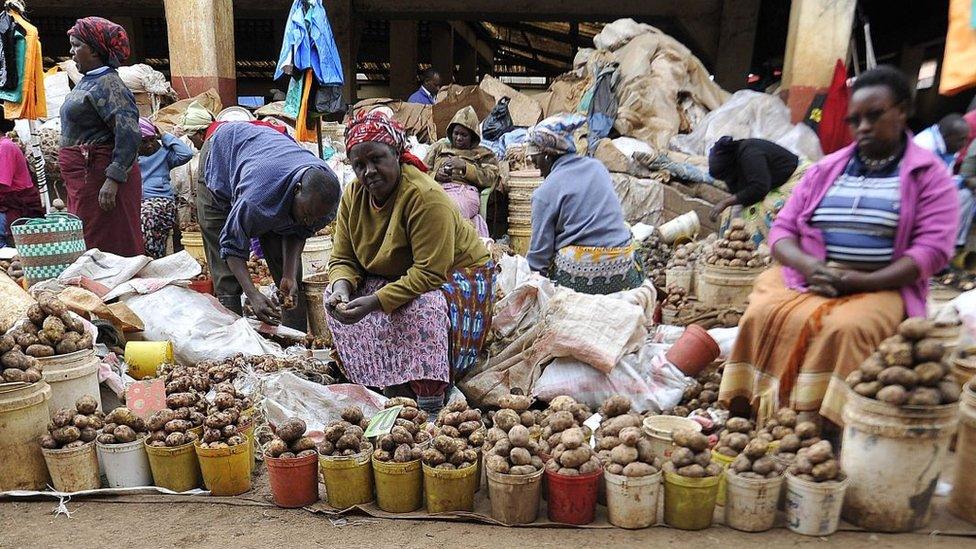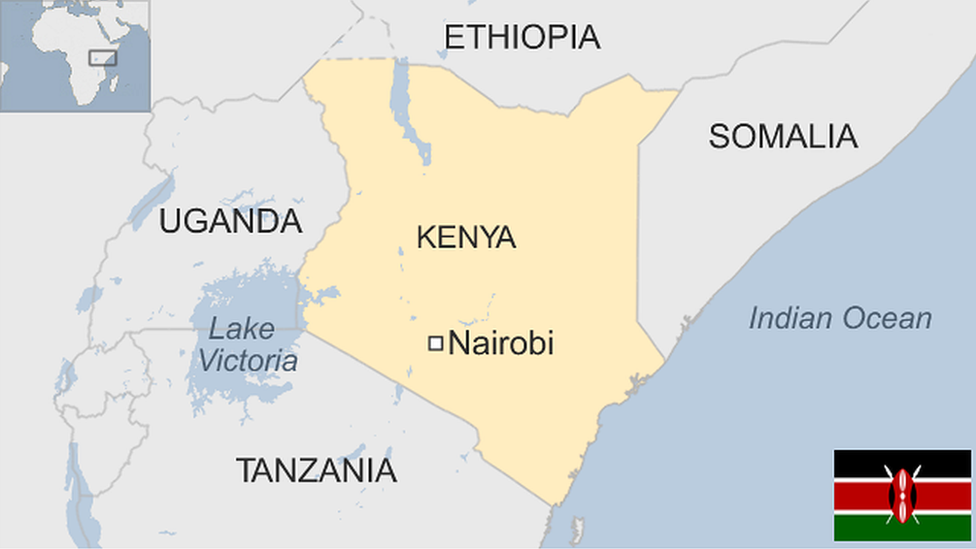How KFC in Kenya got fried over its chip shortage
- Published

KFC opened in Kenya in 2011
In our series of letters from African journalists, Kenyan broadcaster Waihiga Mwaura writes about what the recent row over KFC French fries says about farming in his country.

Needing a quick source of calories as I find a gap in my hectic schedule you can occasionally find me scoffing down a KFC meal.
Biting into a freshly fried French fry can unleash feelings that draw on a subconscious conditioned by years of clever global marketing.
But never have I considered the act as being a political or economic statement about global agricultural trade and Kenya's place in it.
This week though, international supply chains became the hot topic here as KFC said it was unable to offer fries as it could not import its preferred pre-sliced potatoes from Egypt.
Instead, customers were being offered alternatives such as a portion of the national staple ugali, or maize meal - not really what people go to KFC for.
The chain does not source potatoes locally, despite them being commonly grown and farmers having to sell them at low prices.
Potatoes that are safe to eat
Potatoes are, in fact, Kenya's second-most consumed crop after maize, and are cultivated mostly by small-scale farmers.
The problem, apparently, was that potential local suppliers had not gone through KFC's quality assurance process that makes sure "our food is safe for consumption by our customers", the company's East Africa chief executive Jacques Theunissen told the Standard newspaper.

Kenyans love their chips but may be less keen on growing potatoes
He did however say that other ingredients - such as the buns, flour and ice cream - were bought on the Kenyan market and the company has said it is committed to championing local products.
Cue the social media outrage, calls to boycott the fast food chain and an eventual pledge by the company to find a suitable Kenyan supplier.
Nevertheless, rivals were quick to capitalise.
Chicken Inn released an advert with a smiling man tucking into a box of chips - all locally sourced of course.
Burger King also said it had enough fries.
While these other companies can find alternative sources of potatoes, it is not exactly clear why after 11 years of being in the country, KFC has not found a supplier that meets its standards.
Frances Kimemia, governor of potato-growing Nyandarua county, also weighed in saying that his farmers produce quality vegetables. He said that KFC's stance was "insensitive to farmers".
The anger has now begun to cool but this row has exposed the gaps in our agricultural system that mean some of our farmers are denied a decent home market.
Relying on imports
We are part of an increasingly integrated regional trade in food, which has its benefits - not least lower prices.
But as a consequence, if Kenya was forced to close its borders to food imports for just one month, many of our favourite products would soon be unavailable or too expensive to purchase.

Potatoes are one of Kenya's favourite foods
Imports last year from Uganda, for example, amounted to $250m (£165m).
Goods such as eggs, honey, corn, beans, millet, cassava, sorghum and sweet potatoes plus dairy products are transported across the border and then sold locally for a small profit.
Experts say that labour and other farm costs are cheaper in Uganda, making the final product more affordable than what is produced here.
But it could also be an attitude issue. In Uganda I've found that agriculture is embraced by all, whereas in Kenya most people seem to want white-collar jobs.
While covering last year's election in Uganda I interviewed many prominent people who all lived outside the capital, Kampala, on sizeable tracts of land where they grew their own food.
If those same leaders lived in Kenya, they would probably reside in gated housing estates with little farming on site.
It is the same situation when you look at Kenya's trade with Tanzania - our neighbour to the south.
A negative attitude towards farming plus a corruption-riddled sector means that no-one is surprised when fish is imported from China, sugar from Brazil or tobacco from Turkey.
When I bite into a KFC French fry I'll now be distracted by thoughts about global trade"

Kenya might not be able to compete in the short-term when it comes to production costs. But there is an opportunity for Kenya to become a regional centre for food processing, thereby adding value to the product.
Being able to supply pre-sliced locally grown potatoes for KFC is one example of what could be offered to boost the local market.
Unfortunately, a lot of the processing that is happening in Kenya is being conducted by foreign firms funded by venture capital. The profits end up leaving the country.
With an election approaching in August, candidates have been promising jobs, but we haven't heard much about how to revive this agri-business sector.
And few of our prospective lawmakers may be ready to take on the cartels and inefficiencies that have slowed down a sector that once literally fed the country.
Change may be slow - and in the meantime, when I bite into a KFC French fry I'll now be distracted by thoughts about global trade.

More Letters from Africa:

Follow us on Twitter @BBCAfrica, external, on Facebook at BBC Africa, external or on Instagram at bbcafrica, external

Related topics
- Published4 July 2023
